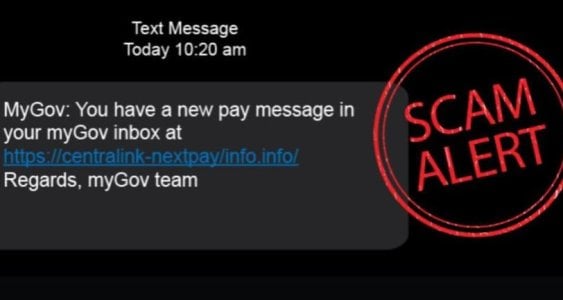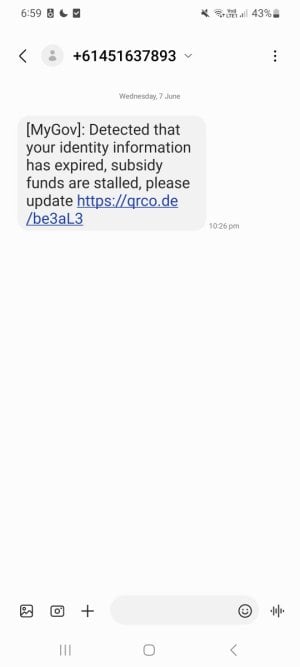Protect your myGov account! New 'pay message' scam targets unsuspecting Australians
- Replies 12
At the Seniors Discount Club, we always strive to keep our members safe, especially when it comes to the ever-changing digital world.
Unfortunately, scams are all too common, and now, a new one is making its way into the inboxes of Australians across the country.
The Australian Communications and Media Authority (ACMA) has issued a warning about a new scam targeting mobile numbers and email addresses, putting people at risk of identity theft.
The sneaky tricksters behind this latest scam use a tactic called ‘phishing’, which lures the unsuspecting victim to click on a potentially harmful link.
According to the ACMA, scammers are sending messages that encourage recipients to click a link to receive a refund, submit tax information, or view correspondence from a service such as myGov.
These messages may appear trustworthy but can lead to trouble if you're not vigilant.
‘Callers may threaten to cancel your services or detain you if you don’t make payments or provide personal details,’ the ACMA said.
One such text message urges people to click on a link to read a ‘pay message’, where the message encourages the recipient to open their myGov inbox – but not all is as it seems.
The ACMA stated that although impersonation scams appear legitimate, consumers should always visit the official website of the agency trying to contact them or get in touch with the agency’s publicly listed phone number for more information.
Scamwatch, the government agency that collects information on reported scams, reveals that over $194 million has been lost through scams so far this year.
Just in April 2023 alone, Scamwatch received an alarming 21,837 reports.
Our advice for our valued members is to stay on alert and keep an eye out for any unusual messages or requests that come your way.
As the ACMA advises, ‘Do not click on any links in emails or SMS. These may be phishing scams designed to steal your personal or financial details.’
This comes after another phishing scam was revealed by the ACCC earlier last month. According to Scamwatch, cybercriminals are sending fraudulent emails to victims claiming to be from myGov.
These emails go so far as to make threats of exposing their victims’ private details to their loved ones unless they comply with their demands and pay a ransom. You can read more on this here.
At the Seniors Discount Club, we believe knowledge is power. Here are some more tips for avoiding online scams and staying safe in the digital world:

What steps have you taken to stay informed and safeguard against scams? Share your tips with us below!
Unfortunately, scams are all too common, and now, a new one is making its way into the inboxes of Australians across the country.
The Australian Communications and Media Authority (ACMA) has issued a warning about a new scam targeting mobile numbers and email addresses, putting people at risk of identity theft.
The sneaky tricksters behind this latest scam use a tactic called ‘phishing’, which lures the unsuspecting victim to click on a potentially harmful link.
According to the ACMA, scammers are sending messages that encourage recipients to click a link to receive a refund, submit tax information, or view correspondence from a service such as myGov.
These messages may appear trustworthy but can lead to trouble if you're not vigilant.
‘Callers may threaten to cancel your services or detain you if you don’t make payments or provide personal details,’ the ACMA said.
One such text message urges people to click on a link to read a ‘pay message’, where the message encourages the recipient to open their myGov inbox – but not all is as it seems.
The ACMA stated that although impersonation scams appear legitimate, consumers should always visit the official website of the agency trying to contact them or get in touch with the agency’s publicly listed phone number for more information.
Scamwatch, the government agency that collects information on reported scams, reveals that over $194 million has been lost through scams so far this year.
Just in April 2023 alone, Scamwatch received an alarming 21,837 reports.
Our advice for our valued members is to stay on alert and keep an eye out for any unusual messages or requests that come your way.
As the ACMA advises, ‘Do not click on any links in emails or SMS. These may be phishing scams designed to steal your personal or financial details.’
This comes after another phishing scam was revealed by the ACCC earlier last month. According to Scamwatch, cybercriminals are sending fraudulent emails to victims claiming to be from myGov.
These emails go so far as to make threats of exposing their victims’ private details to their loved ones unless they comply with their demands and pay a ransom. You can read more on this here.
At the Seniors Discount Club, we believe knowledge is power. Here are some more tips for avoiding online scams and staying safe in the digital world:
- Keep your personal information and passwords secure. Don't share them with anyone.
- Be cautious when clicking on links or downloading attachments, especially if they're from unfamiliar sources.
- Install and regularly update antivirus software on your devices.
- Double-check your privacy settings on social media and other accounts to prevent unwanted access to your information.
- If you suspect a scam, report it to Scamwatch or the relevant authority, and warn your friends and family to be on guard.
Key Takeaways
- A new scam is being sent to people's mobile numbers and emails, which could put them at risk of identity theft.
- The Australian Communications and Media Authority (ACMA) warns targets against clicking on links in these messages.
- Scamwatch reported that more than $194 million had been lost through scams so far this year, with 21,837 reports of scams in April 2023 alone.
- ACMA advises people to always visit official agency websites or contact publicly listed phone numbers for more information and not to click on any links in emails or SMS.
Last edited:










